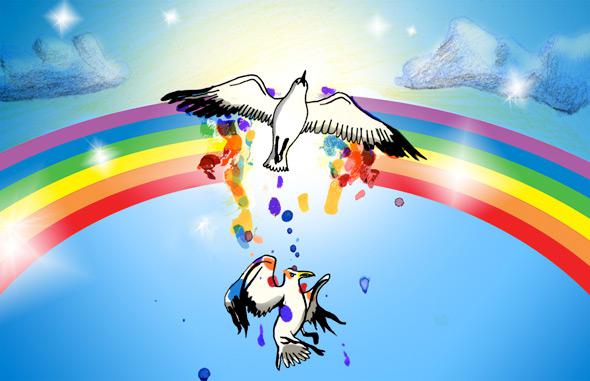There are the books that change your life. Then there are the books that people tell you will change your life. If those people are stoners you met in college, then the books in question are either Zen and the Art of Motorcycle Maintenance, The Electric Kool-Aid Acid Test, or Jonathan Livingston Seagull.
Pray that you don’t wind up with the seagull book. Because nothing is quite as bewildering as digging into Richard Bach’s 1970 novella, having heard over and over again that it will totally blow your mind, only to discover a story about a seagull who loves to fly very fast, rejects the flock (All they do is squabble over food, dude!) and is eventually reincarnated as a seagull angel. By these discriminating standards, one could argue that The Very Hungry Caterpillar offers profound commentary on the capitalist fantasy of overconsumption as path to elite metamorphosis, and Goodnight Moon presents a radical handbook for nonattachment to the material world.
Nonetheless, Jonathan Livingston Seagull is one of the best-selling books of all time, and it’s just been reincarnated as an e-book by Scribner. Bach’s brand new fourth section, written long ago but revised after Bach nearly died in a plane crash in 2012, mines the same unholy common ground between folksy wisdom and Eastern-tinged mysticism found in the original. In this way, Jonathan Livingston Seagull was always way ahead of its time, appealing to regular folks and new-age self-actualization types alike. The book is Tuesdays With Morrie meets The Celestine Prophecy—except with even less complexity, character development, plot, or concrete lessons to offer.
A quick précis. Jonathan practices flying fast. He improves. The flock laughs, calls him names, never lets him join in any seagull games, etc. Jonathan keeps perfecting his flying techniques, and eventually ascends to heaven, at which point an elder gull tells him, “You can go to any place and to any time that you wish to go. I’ve gone everywhere and everywhen I can think of.” The gull explains that, in addition to inventing brand new words, those who pursue perfection “go anywhere, instantly. Remember, Jonathan, heaven isn’t a place or a time, because place and time are so very meaningless.” This is spiritual gobbledygook for the Tao of Pooh crowd, the flat rejection of all that is accepted and known for the supermystical, groovy promise of the murky unknown.
Bach’s Chauncey Gardner–style idiot savant mojo didn’t reach full bloom until JLS became a live-action movie with a Neil Diamond soundtrack. As a seagull soars over the ocean, Diamond’s lyrics reveal all of the answers to the universe, translated into endlessly rearrangeable magnet poetry: “While the sand would become the stone, which begat the spark, turned to living bone,” Diamond sings with conviction. “Be! As a page that aches for a word which speaks on a theme that is timeless!”

Photo by John Shearer/Time Life Pictures/Getty Images
Bach is a former fighter pilot and barnstormer, and flight is very close to his heart. It’s central to JLS’s message, and plays a part in most of Bach’s countless books, from the best-seller Illusions to the less-known Air Ferrets Aloft. “He spoke of very simple things,” Bach writes of a seagull disciple named Fletcher in JLS, “that it is right for a gull to fly, that freedom is the very nature of his being, that whatever stands against that freedom must be set aside, be it ritual or superstition or limitation in any form.”
With these words, Bach unknowingly rode the crest of a wave of simpleton wisdom, part of a rising tide that eventually included Pink Floyd lyrics, Subaru ads, Lady Gaga pull quotes, and the pre-Iraqi-invasion speeches of President George W. Bush. The basic idea? Freedom is good, dude, and the stuff that stands in the way of freedom—whether it be dismissive flock elders, mean school teachers, emotionally distant mothers, bad boyfriends, or sovereign nations with crappy attitudes—should be banished forever. “Set aside, even if it be the Law of the Flock?” a member of the flock asks. Jonathan, possibly anticipating the eventual subversion of due process by leaders who preferred “freedom” to checks and balances, responds: “The only true law is that which leads to freedom. There is no other.”
Thus do we discover, in Jonathan Livingston Seagull, more than just a first flowering of the New Age movement (limits are just figments of pea-sized seagull imaginations!) and a master text for the religiosity of extreme sports culture (masterful flying sends seagulls to heaven!). Reading Bach’s novella can feel like pinpointing the exact moment in American history when our disillusionment and outrage at society’s massive, grand-scale failures yielded to a new kind of personal arrogance, a championing of the individual over the group no matter the cost. Capitalism and the so-called “natural” laws of individualism bled into every dimension of the culture—sports, the self-help movement, overachievement parenting, Wall Street—and were elevated to the realm of higher law, unquestioned and trusted. They became the obvious “right” answer in every circumstance.
The fact that such “no limits!” individualist psychobabble has been co-opted not just by rock climbers and ultramarathon runners and marketing gurus and Presbyterian pastors but also by corrupt politicians, corporate thieves, hedge fund managers, and the NSA should come as no surprise. This, after all, is the allure and the danger of simpleton wisdom: It bypasses the challenges of coexisting with others in a diverse community in favor of pretty pictures, facile promises, and magic. Part 4 of Bach’s book, which decries religion’s status symbols and idol worship, feels like a logical extension of the author’s original clumsy, overbroad message. “In less than two hundred years nearly every element of Jonathan’s teaching was taken out of daily practice by the simple pronouncement that it was Holy, and beyond the aspiration of common gulls, lower-than-sandfleas,” Bach writes. “In time, the rites and ceremonies that were planted around the name of Jonathan Seagull became obsessive.” Jonathan’s lessons have been distorted, reduced to “the ceremony and superstition of those who preferred excuses for failure instead of hard work and greatness.” Once again, Bach offers reductive dichotomies in the place of real insights or wisdom. There are simply those who love hard work and greatness (hurray for greatness!) and those who prefer “excuses for failure” (boo to excuse-making failures!).
Those who love greatness also love freedom, needless to say. But if place and time are so very meaningless, and whatever stands in the way of freedom is bad, why not just do whatever you want, and to hell with the small-minded sheep who want to impose behavioral codes or request cooperation for the sake of the greater good?
The new section of Jonathan Livingston Seagull has not been greeted with enormous fanfare, which might seem encouraging. But the book has already made its mark, and continues to be celebrated as a parable of enlightenment and courageous rebellion. (Justin Bieber’s first tattoo was the seagull silhouette from the book’s cover.) We should, instead, recognize Bach’s book as a harbinger not just of the glut of simpleton wisdom that came to crowd out worthier entries on the nonfiction best-seller list over the last 40 years, but of the rise of simpleton culture at large, which so often shuns complexity for easy answers and empty slogans.
Of course, easy answers and empty slogans do seem to reign everywhere and everywhen. Just ask that other author of animal parables, George Orwell.
—
Jonathan Livingston Seagull by Richard Bach. Scribner.
See all the pieces in this month’s Slate Book Review.
Sign up for the Slate Book Review monthly newsletter.
